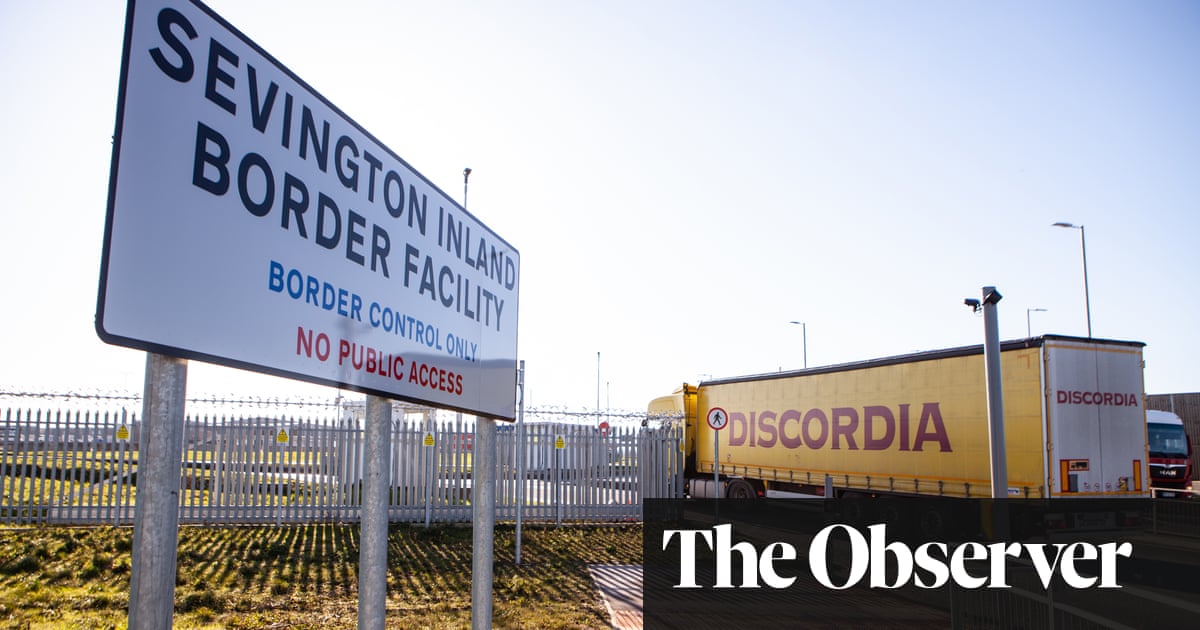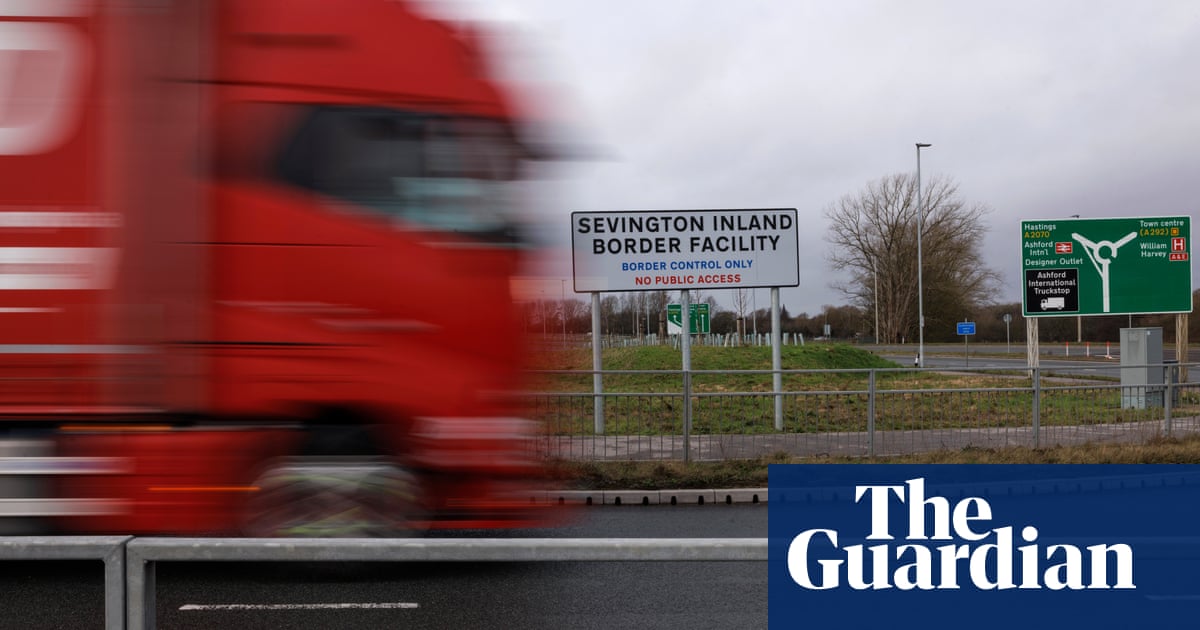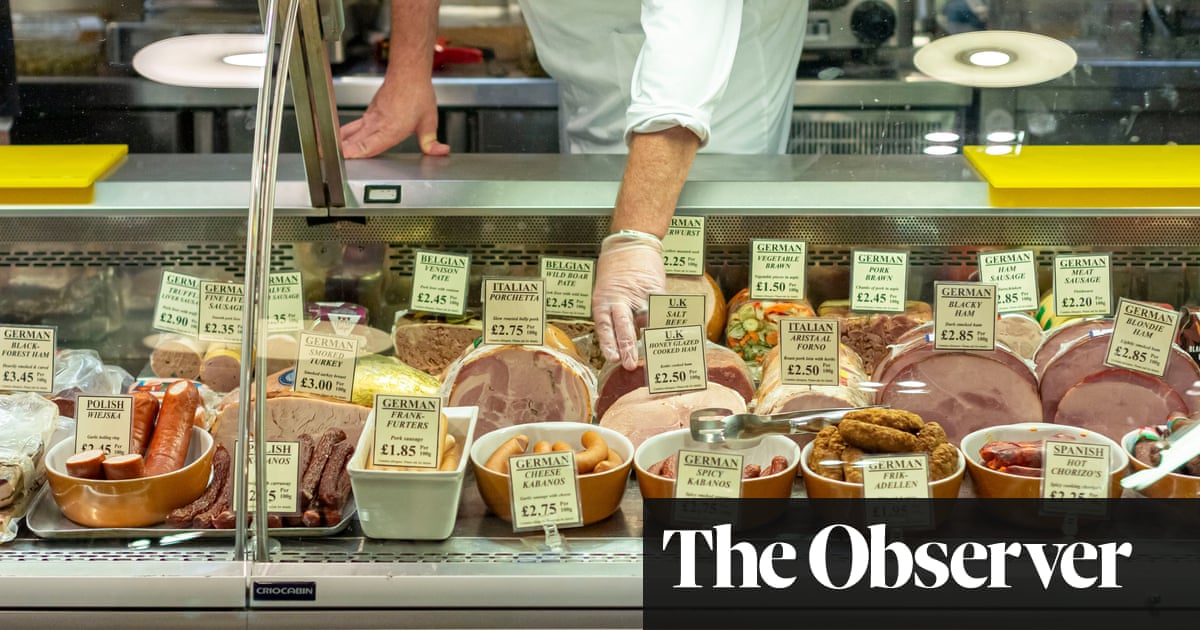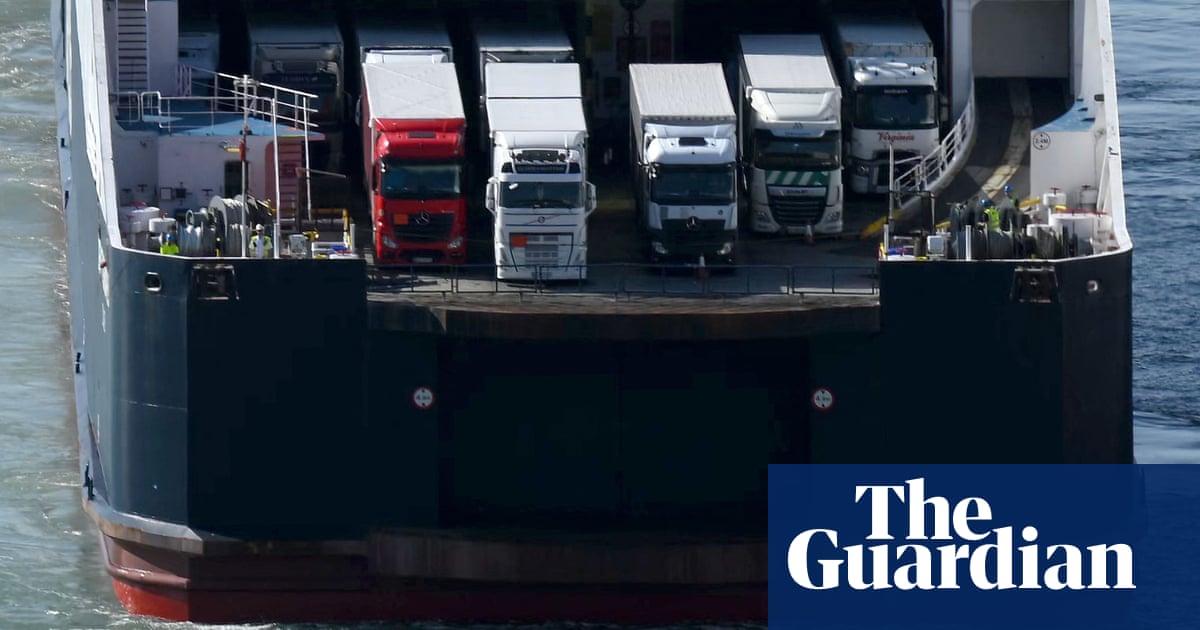
“Before Brexit, we could phone up on Monday and have the plants here by Wednesday – it was dead easy,” says Richard McKenna, managing director of Provender Nurseries, as he stands surrounded by trolleys holding hundreds of plants at its 8 hectare (20 acre) site in Swanley, Kent.
From its base in the garden of England, Provender is one of the country’s largest wholesale nurseries, selling up to 5,000 different lines of plants and trees to 11,000 businesses across the south-east. More than half are imported directly from countries in the EU. “We bring in product from across Europe – we have imported around €2.5m this year,” he says.
Post-Brexit requirements mean that Provender now has to secure phytosanitary certificates – health checks – before plants can be shipped, costing tens or hundreds of thousands of pounds each year and sometimes adding a week to delivery times.
McKenna is now bracing for more delays and costs. In April, many animal and plant products coming from mainland Europe will have to undergo physical checks at newly installed UK border posts. “With the changes, it is all a big unknown. The biggest unknowns are the cost of delay, the cost of damage – it’s just more added costs,” he says.
And McKenna is not alone in his concern. Importers of plants, meat and dairy products from mainland Europe are now readying themselves for the most significant change to how goods arrive in the UK since it left the single market three years ago.
This week the government will fire the starting gun on its new border policy. The catchily named border target operating model (BTOM) will look to mirror the controls the EU has for UK companies trying to export to mainland Europe.
From Wednesday, all imported plant and animal products will be categorised as low, medium or high risk. Those seen as medium and high, which includes meat and dairy products, as well as most plants, will now require checks from plant health inspectors or vets before they can be transported.
This comes before the more significant changes on 30 April, when these products will be physically checked at new border posts in the UK.
The government believes this will reduce the risk of importing harmful plant or animal diseases, while not significantly hindering trade, or heaping costs on to the consumer.
UK bosses are less confident. Instead of the smooth transition the government is hoping for, businesses that the Observer has spoken to paint a picture of widespread confusion, escalating costs for companies – an estimated £330m a year – and fears that the new border posts will not be able to cope.
Origins of the new policy
The changes that come in on Wednesday will echo what the EU has had in place for UK exporters for the past three years.
When the UK officially left the single market on 1 January 2021, sanitary certificates for meat and dairy, and phytosanitary certificates for plant products, were required for all UK exports crossing the Channel to mainland Europe. Physical inspections were also introduced at EU borders.
There are reasons why the UK wants to reciprocate. First, World Trade Organization rules state that trade borders for the EU need to match those of the rest of the world, so as not to give the bloc a trading advantage.
It is also under pressure from some UK industries, such as meat and poultry farmers, that felt no trade border meant they were hamstrung in two markets, facing higher hurdles to export and having to compete domestically with EU importers that had unfettered access to the UK.
Minette Batters, the National Farmers’ Union (NFU) president, says that many meat and dairy farmers feel this way: “They want to see that, on this side, EU exporters are facing the same gamut of checks that they [British firms] have had to.”
Westminster initially intended a swift change. Health certificates for imports were to be brought in by April 2021 and border checks were set to follow in July 2021. The government quickly backtracked, admitting businesses were not ready and the border infrastructure would not be in place in time.
This included a new computer system, IPAFFS (import of products, animals, food and feed system), which was set up to manage the new documents needed for the new processes, not yet operating at full capacity.
Meanwhile, 30 planned border posts needed to process goods had not been finished – and in some cases construction had barely begun.
At the time, Michael Gove, the then Cabinet Office minister, said the government had responded to businesses’ requests for more time, blaming the pandemic for the lack of readiness. Now, five delays later, the BTOM finally looks as though it will be implemented. Yet, despite the three-year gap, many of the same problems persist.
Businesses are not ready
For the smooth flow of trade to continue, companies on both sides of the Channel need to understand the rules. Evidence suggests many are in the dark.
A straw poll by the Institute of Export and International Trade (IOE&IT) in October found that fewer than a fifth of UK businesses were clear about whether the changes would affect them.
For European firms, there is also confusion. Tom Southall, executive director at the Cold Chain Federation, the UK’s trade association for the temperature-controlled logistics industry, says recent delays happened largely because European companies were not ready.
“There’s been a lot of concern that there hasn’t been enough engagement with EU member states to get them ready,” he says. “And this has the risk that if we introduce these requirements, there could be a drop-off in food imports because suppliers aren’t ready.”
Marco Forgione, director general of the IOE&IT, says recent visits he has made to mainland Europe have painted a picture of confusion over what is coming.
“I was in Italy a few weeks ago speaking to a body that represents SMEs [small and medium enterprises], and it was clear that the community of businesses don’t understand the requirements,” he says, adding that the IOE&IT’s team in Brussels had received similar reports from other EU countries.
And those that do understand the requirements face having to find a plant health inspector or a vet in their country to sign the health certificates – a task made harder by the lack of vets across the EU.
Last week, the British Meat Processors Association warned that exporters to the UK were experiencing a lack of veterinary capacity in mainland Europe, particularly at weekends.
Nick Carlucci, sales director at the Italian food importer Tenuta Marmorelle, has also heard of several importers in Italy opting against exporting to the UK because of the post-Brexit red tape.
“They have said it is not worth our while – the UK is not a big enough market for us,” he says. “It’s a shame because the end user will ultimately lose these specialist products.”
It is hard to assess just how many European businesses are shunning the UK because of the new changes, but looking at what happened immediately after the EU imposed its controls on 1 January 2021 may offer some clues. Across January 2021, total exports from the UK to the EU sank by 40%, or about £5.6bn, while food and live animal exports dropped by almost 64%.
For those that will continue to export, the likelihood of being turned away at the border from Wednesday seems low – that is, until the end of April, anyway.
The government has indicated that January to April will be treated as a bedding-in period.
“The idea is that from January certifications will be required but they will not be turning away people from the border, but giving warnings and advice over compliance – this is to give people a bit more time to get used to it,” says Southall.
However, the spectre of crucial imports being turned back or dozens of lorries being held for hours at the government’s new border control posts hangs over 30 April, when the physical checks are introduced.
Border control posts
Residents in the quiet Kent village of Sevington, near Ashford, have been getting used to the rumble of construction lorries nearby in recent years. After the UK officially left the EU in 2021, the site was chosen as the home for a new 93-hectare facility that would become the main processing hub for imports that come through the Port of Dover, the country’s busiest sea terminal.
The vast site, which is 22 miles inland from Dover, has several large logistics sheds for processing imports, 1,700 heavy goods parking spots and a 3.6 metre high (12ft) perimeter fence.
Completed more than 18 months ago, it has sat largely empty since then, populated only by security staff and the occasional pet arriving from Ukraine. This has led to some locals describing it as a “white elephant” which they suspect is destined to become a new housing estate before too long.
But by the end of April, residents will once again have to get used to the hum of lorries, this time for haulage, when Sevington comes online. It will be a key part of the government’s new border plans and the first point for millions of tonnes of plant and health products coming into the country.
But there are fears over whether it and the other new border posts are ready. When the government first announced that it would be bringing in physical checks on imports from July 2021, it expected these to take place at 30 designated border control posts (BCPs). These posts consisted of existing facilities at ports and airports, as well as a string of new BCPs.
They included the £154m Sevington facility off the M20, while others at Portsmouth, and at Killingholme in north Lincolnshire, were also planned. When the government announced its first delay in 2021, these had not been finished.
But while the facilities at Sevington, Portsmouth and Killingholme have now been built, there is still confusion about how they will work.
At a recent press conference the IOE&IT’s senior trade adviser, Anna Doherty, confirmed that crucial details such as opening hours, and what products certain posts could handle, had yet to be given to industry. And despite the new border controls becoming operational in just 13 weeks, businesses are still in the dark on the costs.
In July last year, the government launched a consultation suggesting that it would put a “common user charge” of between £20 and £43 on every consignment going through the BCP. But the government has yet to decide on a final figure, which is causing havoc for businesses.
“It’s just impossible to plan. It’s hard to work out whether it is worth making any alternative plans because you just don’t know what the costs are going to be,” says Jonathan Whittemore, commercial business manager at Johnsons Nurseries, based in Cattal, North Yorkshire.
Businesses have also expressed concern that despite hundreds of millions of pounds of imports coming through the border at the end of April, BCPs such as Sevington have lain largely dormant since construction, and no testing or trialling has taken place.
As the Horticultural Trades Association says, this is particularly problematic for growers, as the mid-spring launch date comes in the middle of their peak importing season.
Tim Rozendaal, strategic adviser for the VGB, the main association in the Netherlands for horticultural wholesalers, fears that even without any hiccups, huge queues are inevitable.
He says: “Even now with the Port of Harwich confirming it will be open for 24 hours, it will see 150 lorries that need 100% inspection on a peak day. This would still cause big delays to the current supply chain for fresh and perishable goods.”
And there are also fears that high levels of products could be lost or damaged when going through the border.
Last week, the NFU said that these checks at the borders could pose an existential risk to the UK growers, damaging businesses and affecting next year’s crops. It added that the checks on nearly all young plants could cause long delays, and handling by non-specialists could result in damaged stock.
And while it is medium- and high-risk products that will be checked, many of these goods will be delivered alongside lower-risk fare.
Nigel Jenney, chief executive of the Fresh Produce Consortium, says this could have a detrimental impact on fresh fruit and veg, which is currently deemed low risk but travels with higher-risk products.
The government is setting up a system whereby businesses can get permission for control posts within their own premises, in conjunction with the government. But these are still in their early stages and require huge investments of time and money.
Provender Nurseries recently received permission to build one such facility at its site but the process has not been simple, admits Stuart Tickner, its head of nursery, biosecurity and production.
“In terms of investment, I think it will cost us about £90,000, and over the last two years and four months, we have clocked up thousands of hours just for this alone,” he says.
Food safety fears
Biosecurity was one of the key reasons that BCPs were set up. With the increased of risk of diseases such as African swine flu, and xylella for plants, the hope is that more checks at ports could catch diseases early before entering the country. But some business owners believe that these new posts could increase cross-contamination.
The British Tomato Growers’ Association has raised particular worries about this, saying the border posts could introduce a significant point of infection, which puts growers at risk of crop failure, and losing huge sums of money.
Even the Dover Port Health Authority has raised biosecurity concerns about the government’s decision to send all plant and animal products to the government-run Sevington BCP, 22 miles inland, near Ashford in Kent, rather than at a site closer to the port.
Lucy Manzano, head of port health and public protection at Dover district council, recently said that the decision was “not in the best interests of biosecurity and food safety” and increased the risk of a “catastrophic disease outbreak, akin to foot and mouth”.
The government has insisted that it has engaged extensively with industry over the changes, adding that the new BTOM will introduce an “innovative approach” to imports that would use technology and data to simplify trade, while maintaining the flow and security of goods.
A spokesperson said: “The changes we’re bringing in will help keep the UK safe, while protecting our food supply chains and our agricultural sector from disease outbreaks that would cause significant economic harm.”
However, the concerns over readiness of the BCPs have led to some calls for delays to the implementation of the changes, with the VGB, which represents Dutch flower growers, calling for physical checks to be delayed until at least 2025. The Horticultural Trades Association has suggested a soft launch of the posts until at least the end of January 2025.
A letter sent to the government from Labour frontbencher Nick Thomas-Symonds last week warned that the 31 January start date risked queues at ports, and questioned whether the government would go through with it, given the five previous delays.
But Marco Forgione, director general of the Institute of Export and International Trade, believes that the country cannot afford any further delays.
He says: “If this is happening, it has to happen – we cannot afford another delay … A delay again would not just undermine the investment that has been made by businesses – waste money, time and effort – but will also undermine the credibility of the UK border.”











